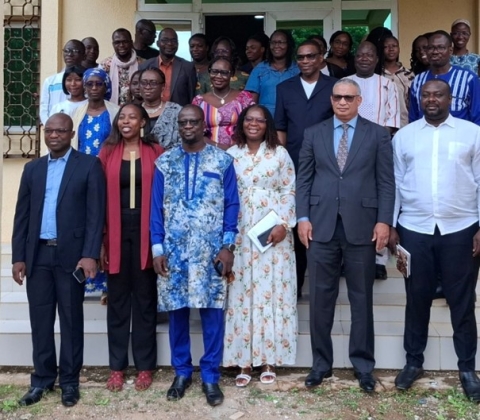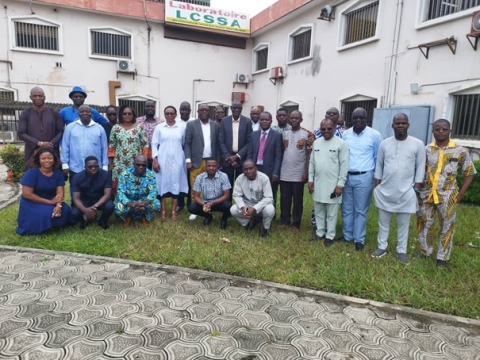
More than 50 actors and partners involved in food insecurity risk management gathered in Lomé from 2 to 4 July to strengthen their capacities on the concepts, principles and mechanisms of disaster risk financing (DRF), with a particular focus on agricultural and food risk transfer.
Initiated by ECOWAS, this training session produced several concrete results in terms of experience sharing, technical capacity building and policy dialogue. These results reflect the commitment of countries and regional institutions to structuring a proactive response to growing agricultural, climate and food risks in the ECOWAS region. They also demonstrate collective efforts to improve coordination, data governance and sustainable financing of risk management mechanisms.
Over three days, participants – comprising technical officials and decision-makers from ECOWAS, as well as representatives from partner institutions such as the BIDC and CILSS, not to mention national technicians from the ministries responsible for agriculture and food security in ECOWAS member countries – benefited from exchanges with experts from ECOWAS, the World Bank, Willis Towers Watson/Munich Re, African Risk Capacity and Y-FOCUS. the AES and CILSS – benefited from exchanges with experts from ECOWAS, the World Bank, Willis Towers Watson/Munich Re, African Risk Capacity, Yeleen Assurances and CILSS.
Through inclusive and participatory exchanges between trainers and learners, as well as panel discussions, the main determinants of cyclical food and nutrition insecurity in the West African sub-region were shared. There are many causes: conflict, flooding, price spikes, climate shocks, low availability of inputs, inflation, currency depreciation, post-harvest losses, and limited access to a healthy diet. Population growth exceeds agricultural gains, exacerbating structural deficits.
Faced with this situation, what should be done? This central question was addressed through the sharing of experiences from other regions of Africa and around the world. In an educational style, the trainers presented the principles of disaster risk and food insecurity modelling with examples from the African Risk Capacity (ARC) and Willis Towers Watson.
In risk management, data is crucial and decisive not only for modelling but also for the form and type of response to be provided in the event of a disaster. Our sub-region does not sufficiently document data in this area at the country and regional levels, despite the efforts of CILSS to collect, process and disseminate agrometeorological data.
Risk financing was a very important aspect of this training. The World Bank and the insurance structures present emphasised the fundamental principles and instruments and strategies of disaster risk financing. For them, it is important to prepare financially before a shock occurs, as the costs of repair are often much higher than those of prevention. The DRF is based on four key principles: speed of mobilisation of funds, reliability of mechanisms, reasonable cost and transparency in distribution.
Participants were equipped with tools on financing and risk management mechanisms related to food insecurity. They acquired skills in risk modelling, transfer instruments (insurance, early action, emergency funds), and sustainable and regionalised co-financing approaches. The ultimate goal was to strengthen their capacity to anticipate, finance and effectively manage food and climate shocks, with a view to building structural resilience at the national and regional levels, through the integration of Disaster Risk Financing (DRF) into public policies and the Regional Food Security Reserve.
That is why the Executive Director of the Regional Agency for Agriculture and Food (RAAF), Mr Mohamed Zongo, on behalf of the Commissioner for Economic Affairs and Agriculture, Ms Massandjé Touré-Litsé, during the opening of the proceedings, emphasised that ‘for ECOWAS, this meeting is an opportunity to strengthen the autonomy not only of the Commission but also of Member States in the design, management and mobilisation of innovative financing mechanisms to address food and nutrition insecurity risks in the region’.
During the panel discussions, countries shared existing mechanisms for responding to disasters and, above all, the funding mobilised and secured for this purpose. This capacity-building session also provided a framework for all stakeholders and partners to call on regional and national decision-makers to place agricultural financing and insurance mechanisms at the heart of their agricultural development strategies, which are not yet a reality due to a lack of clear understanding and reliable data.
According to the World Bank, which is supporting this initiative through the FSRP, ‘food insecurity risk management practitioners have consolidated their technical skills to promote effective ownership of risk financing mechanisms to effectively combat food insecurity in West Africa,’ according to its representative, Ms Ruth Samson.
Following this training, the ongoing feasibility study aimed at providing the region with a risk financing mechanism, including agricultural insurance, will enable ECOWAS, through the RAAF, to strengthen its response capacity. It will thus contribute to improving the effectiveness of the Regional Food Security Reserve's actions on the ground, in support of the efforts of States, to better prevent and mitigate the risks of food insecurity in West Africa.







